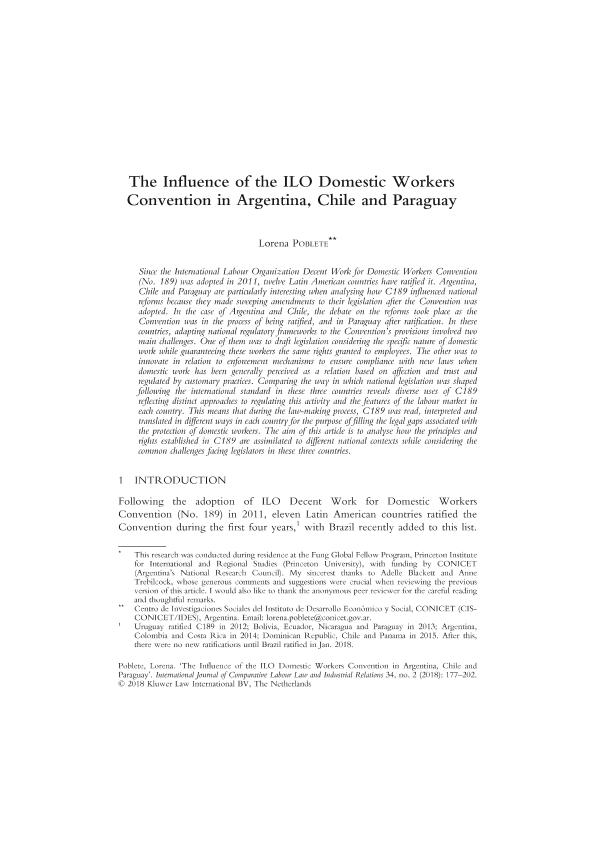Mostrar el registro sencillo del ítem
dc.contributor.author
Poblete, Lorena Silvina

dc.date.available
2019-12-13T19:36:31Z
dc.date.issued
2018-07
dc.identifier.citation
Poblete, Lorena Silvina; The influence of the ILO domestic workers convention in Argentina, Chile and Paraguay; Kluwer Law International; International Journal of Comparative Labour Law and Industrial Relations; 34; 2; 7-2018; 177-201
dc.identifier.issn
0952-617X
dc.identifier.uri
http://hdl.handle.net/11336/92211
dc.description.abstract
Since the ILO Decent Work for Domestic Workers Convention (No. 189) was adopted in 2011, eleven Latin American countries have ratified it. Argentina, Chile and Paraguay are particularly interesting when analysing how C189 influenced national reforms because they made sweeping reforms to their legislation after the Convention was adopted. In the case of Argentina and Chile, the debate on new laws occurred as the Convention was in the process of being ratified, and in Paraguay after ratification. Adapting national regulatory frameworks to the Convention´s provisions involved two main challenges. One of them was to draft legislation considering the specific nature of domestic work while also guaranteeing these workers the same rights granted to employees. The additional challenge was to innovate in relation to enforcement mechanisms to ensure compliance with new laws when domestic work has been generally perceived as a relation based on affection and trust - like family. Comparing the way in which national legislation was adapted to the international standard in these three countries reveals diverse uses of C189 linked with distinct approaches to regulating this activity and the features of the labour market in each country. This means that during the law-making process, C189 was read, interpreted and translated in different ways in each country with the same goal of filling the legal gaps associated with the protection of domestic workers. The aim of this article, then, is to analyse how the principles and rights established in C189 are assimilated to different national contexts while considering the common challenges that legislators faced in these three countries.
dc.format
application/pdf
dc.language.iso
eng
dc.publisher
Kluwer Law International
dc.rights
info:eu-repo/semantics/openAccess
dc.rights.uri
https://creativecommons.org/licenses/by-nc-sa/2.5/ar/
dc.subject
DOMESTIC WORK
dc.subject
LABOUR LAW
dc.subject
FORMALIZATION
dc.subject
LATIN AMERICA
dc.subject.classification
Sociología

dc.subject.classification
Sociología

dc.subject.classification
CIENCIAS SOCIALES

dc.title
The influence of the ILO domestic workers convention in Argentina, Chile and Paraguay
dc.type
info:eu-repo/semantics/article
dc.type
info:ar-repo/semantics/artículo
dc.type
info:eu-repo/semantics/publishedVersion
dc.date.updated
2019-10-22T17:59:01Z
dc.journal.volume
34
dc.journal.number
2
dc.journal.pagination
177-201
dc.journal.pais
Países Bajos

dc.description.fil
Fil: Poblete, Lorena Silvina. Consejo Nacional de Investigaciones Científicas y Técnicas. Oficina de Coordinación Administrativa Parque Centenario. Centro de Investigaciones Sociales. Instituto de Desarrollo Económico y Social. Centro de Investigaciones Sociales; Argentina
dc.journal.title
International Journal of Comparative Labour Law and Industrial Relations
dc.relation.alternativeid
info:eu-repo/semantics/altIdentifier/url/http://www.kluwerlawonline.com/abstract.php?id=IJCL2018008
Archivos asociados
